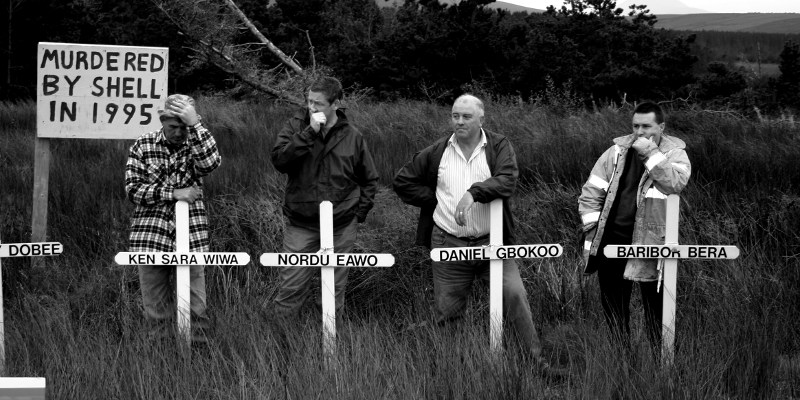People Powered Movement vs Shell
a century of decolonial contestation
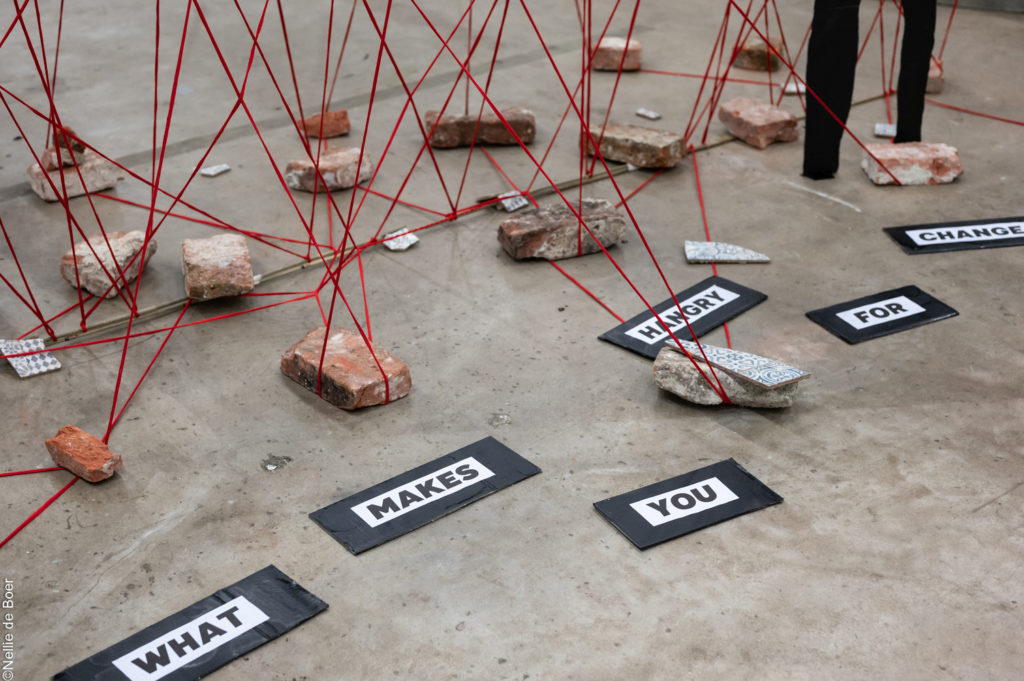
The media producer Chihiro Geuzebroek from the decolonial foundation Aralez invited me to organize an exhibition with the support of Milieudefensie – Friends of the Earth Netherlands. After four months of research, we exposed insights of contestation movements against Royal Dutch Shell from the past century through the expo “People Powered Movement vs Shell – a century of decolonial contestation“.
Twenty installations were available at NDSM-Fuse between October 30th and December 6th 2020. Find their description below.
MAKING OF
When Chihiro approached me, the aim of the exhibition was already in line with the rest of her projects and performances: driven by her mission to “RESTORE & RESTORY our relationship with Earth and Each other”.
We did restore aspects of our relationship with Earth by collecting and assembling archives on struggles lead by communities protecting themselves and their land from the biggest polluters. Our panel “Reclaiming culture” and our installations recalling past actions from groups committed to hold Shell accountable in various domains also helped us show our visitors the numerous sectors invaded by Shell.
And above the parallel course of Parts Per Million vs People Powered Movements, our collection of information going a century back in time highlights how antiracism is bound to climate justice struggles, confirming we have much to learn from our ancestors.
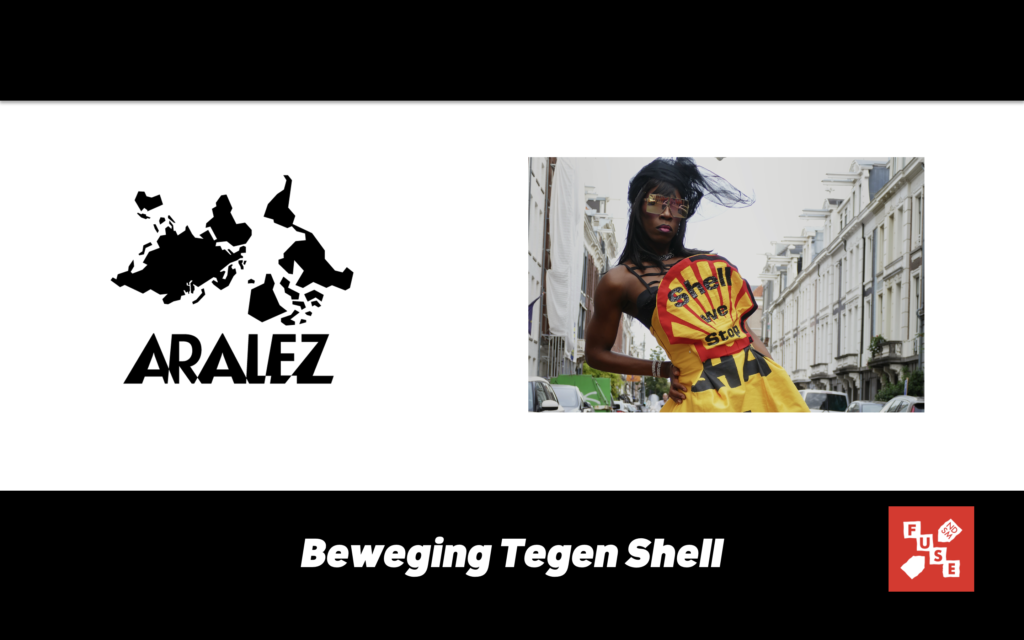
COMMON THREADS OF STRUGGLE AGAINST ROYAL DUTCH SHELL
01. COLONIAL APPROPRIATION
Chihiro Geuzebroek
When we ask ourselves what allowed Shell to grow into a multinational that leaves its footprint all over the world, we have to look at its origin story. While Royal Shell was formed in 1907 by the merger of Dutch Bataafse Petroleum Maatschappij/BPM and British Shell enterprises, we look at how a Dutch company that got the upper hand (60%- 40%) of the deal grew its position.
This is a story of colonial appropriation of other people’s land, other people’s labor and good relations within Dutch colonial government, colonial military (KNIL) and commerce. The first signs of resistance are found in Indonesia. The people power comes from the workforce.
See whose labor made Bataafse Petroleum – that merged into Shell – grow rich.
Images: KITLV Universitaire Bibliotheken Leiden
Collage: Woonkyung Yeo, Palembang in the 1950s: The Making and Unmaking of a Region
02. AS BELOW SO ABOVE
Chihiro Geuzebroek, Anna Bissila
Earth, bamboo, carton boards, papier mâché and collages.
As Below So Above is the experience of the Earth as a crime scene, composed of vivid news items concerning the many ways Shell impacts people, places and politics. Extracts of headlines, reports, articles and such reaching skies in this web demonstrate some of the grievances that brew a fertile ground for People Powered Movements… Explore and find first protests in 20th century were decolonial, anti-racist and often initiated by exploited Shell workforce itself. With As Below So Above, we are starting our journey with a grounded perspective, mapping the redlines and shedding light on the harm imposed on our common birthplace.
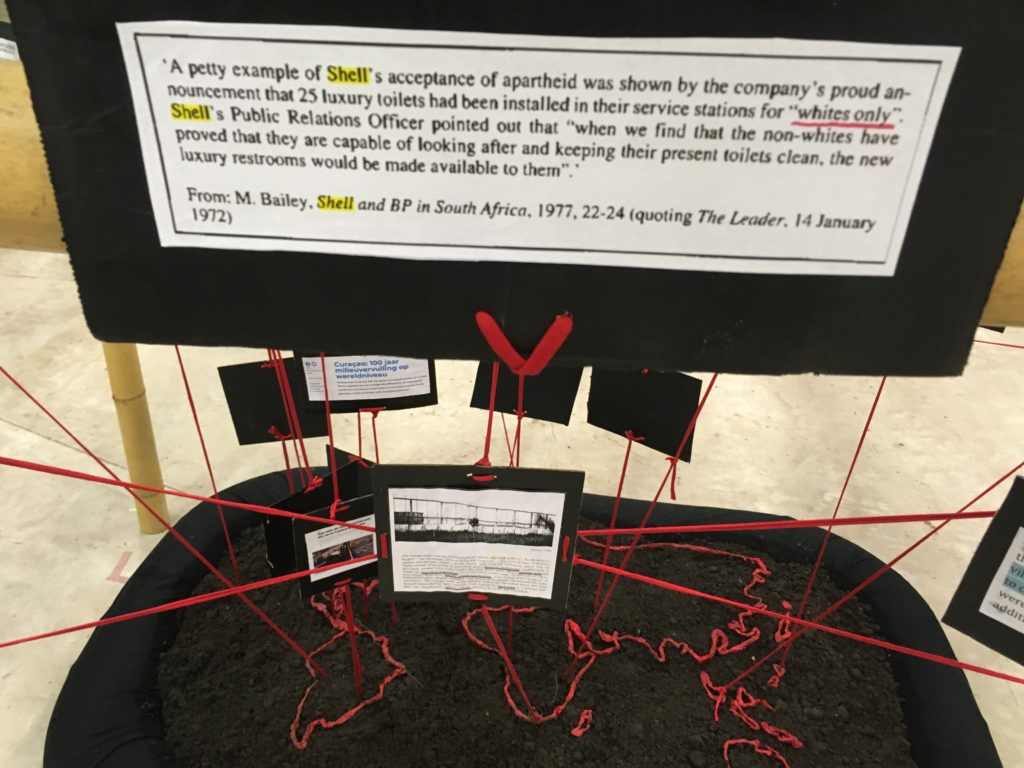
03. GRONINGEN PIECES
Chihiro Geuzebroek & team
Web of redlines, carton board, rubble from houses damaged by earthquakes in Groningen.
The rubble on the ground are bits of people’s homes that got shaken up because of gasquakes. In the 1960’s, there were already warning signs, precedents and predictions that gas extraction would lead to soil movement up to one meter, and earthquakes. But the safety and well-being of Groningers was sacrificed for privatized profits of Shell, Exxon and the Dutch state.
Source: Bricks from Groningen homes
04. SILENCE WOULD BE TREASON
Chihiro Geuzebroek
Pictures, Quotes from Ken Saro-Wiva on earth.
25 years ago, on November 10th, the life of Ken Saro-Wiva was taken away by the Nigerian military state, for defending his land and people from the practices of Shell on the Ogoni territory. This day, we lost an earth defender who knew that in front of injustice, “silence would be treason”.
With life being a cycle, the seeds of Saro-Wiva’s wisdom are all but lost. It is still inspiring numerous communities and activist groups. We invite you to let this food for thoughts run through you.
Sources: Corley, I., Fallon, H., and Cox, L. (2018) and Silence would be treason, last writings of Ken Saro-Wiva. Daraja Press
05. ANTIAPARTHEID ARTWORK
Kees Stad (collages) – 1980s, The Netherlands
Collages of printworks from grassroots activists engaged in anti-apartheid solidarity actions in the Netherlands, mixed with news clippings.
“This is grey material* you will not find in the archives” Kees says. In school we do not learn solidarity and what others have done to dismantle white supremacy, or about tanks and fossil fuel that backed up apartheid oppression. In the 1980’s, coordinated property destruction led up to 36 Shell gas stations being sabotaged. Lots of alliances were made of moderate and radicals. Even Shell workers came to some marches and blockades as they were horrified that their management fuelled apartheid.
*Note: During our panel on Archive and Activism at Basis voor Aktuele Kunst in Utrecht, Kees Stad highlighted the scarcity of grassroots content on common, “official” archives (ie. stickers, leaflets…). What value do we give them?
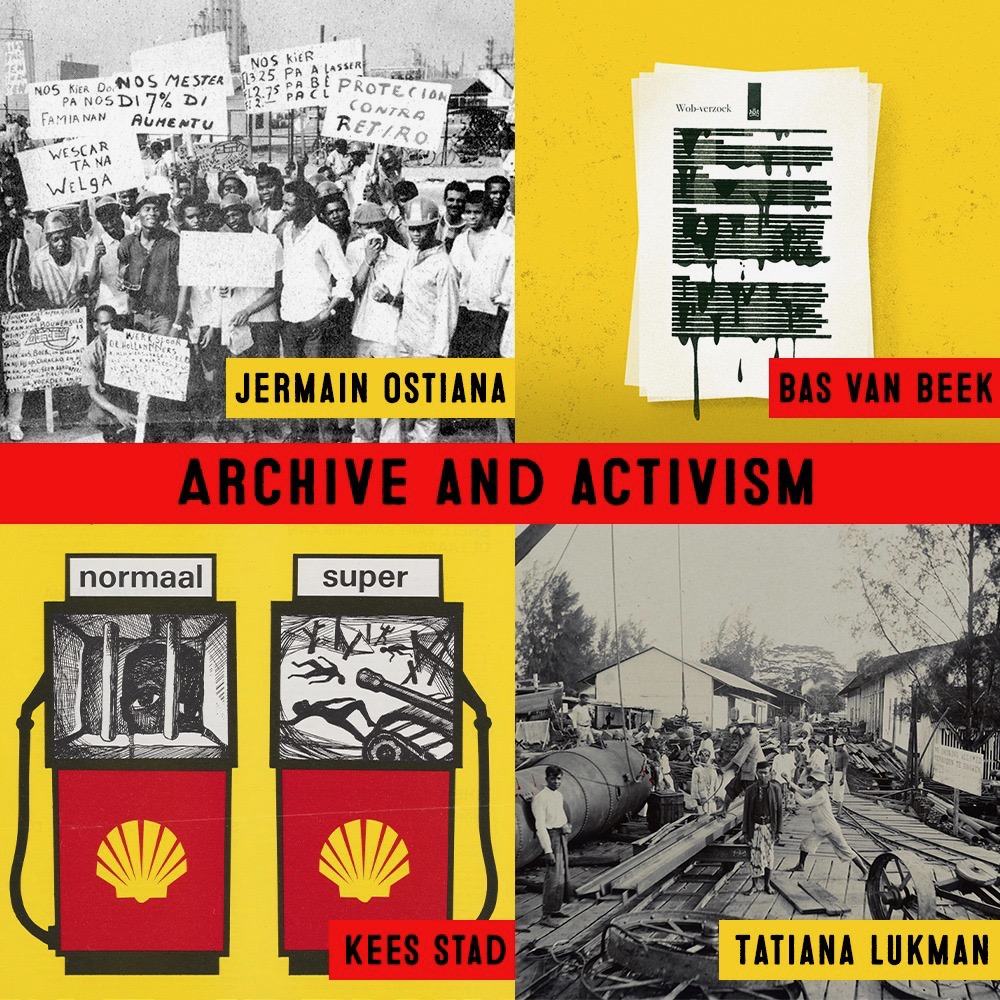
IISG Archive (posters) – 1980s, The Netherlands
- Oranje Steunt Apartheid
- Springtij. Massaal blokkade spektakel bij het Shell laboratorium Amsterdam
- Do the Right Thing: Rij Shell Voorbij
- Wer Shell tankt, tankt apartheid & gentechnologie! Shell raus aus SüdAfrika
- Shell in Zuidelijk Afrika
- Shell smeer ‘m uit Zuid-Afrika
- Shell fuels apartheid
06. PPM RISING
Chihiro Geuzebroek, Anna Bissila
Cloth banners, textile paint, wire.
Massive extraction of fossil fuels propels greenhouse gases concentration – Parts Per Million – to rise in the atmosphere. In climate activism focused on the science frame and oriented on saving the future, the “graph of rising ppm” is presented as a reason to sound the alarm. Yet the parts per million of CO2 remain merely a symptom of the problem. The root of the crisis is colonialism and the myth of “discovery” that is really marketing structural dispossession of people and places that leads to major deficits of ecological commons and extinction crisis.
If we look back at history and read between the lines, we find the antibodies of the systemic assault of fossil fuel industry. We find that from the early days of colonial oil & gas extractivism, there was People Powered resistance. With PPM RISING we pay tribute to the rising heartbeat of activists creating a rising People Powered Movement.
Sources: https://sealevel.info/co2.html
07. CULTURE JAMMING vs OIL
Chihiro Geuzebroek
In 2019 different Greenpeace offices worked together with grassroots groups against oil & gas industries on a day of action: CULTUREJAMMING vs OIL. In 30 places around the world, groups reported with pictures of culture jamming.
Culture jamming (sometimes guerrilla communication) is a protest used by many anti-consumerist social movements to disrupt or subvert media culture and its mainstream cultural institutions, including corporate advertising. – Wikipedia
08. ONCE UPON A PLACE
Grassroots audio stories & videos from diverse groups.
- Audio story from Curaçao. Jermain Ostiana – 2020
Story shared by Jermain Ostiana is Black working class ancestral avenger from Curaçao. His decolonial enforcement is rooted in Caribbean liberatory writing, poetry and graphic art emphasizing the deconstruction of dutch colonialism in the Caribbean.
- Audio story from Nigeria. Friday Barilule Nbani – 2020
Story shared by Comr. Nbani Friday Barilule aimed at making the society a healthy, peaceful and comfortable place for all mankind and to attract young one to meaningful development in the society. Comr. Friday is a socialist, environmentalist and Rights activist who has successful championed grassroots campaign on environment, anti corruption, climate change, Coal, Oil, health and people’s rights in Nigeria. He is currently executive director of Lekeh Development Foundation LEDEF.
- Groningen – Dit moet je weten. Code Rood – 2017
Portrait of people active in Code Rood and Groninger Bodem Beweging, 2017: The people of Groningen protest together with the action group Code Rood after numerous gasquakes destroying their houses.
- Turtle Island. Paddle to Seattle, Greenpeace USA – 2015
Thousands of people gathered to speak out against Shell’s Arctic-bound oil rig: Indigenous earth defenders from Inupiaq people, Tikigaq, Duwamish, Gwich’in (RED OIL) Philippines, taking action together Raging Granny, 350 org and Greenpeace USA.
- Shell Must Fall song. Chihiro Geuzebroek & Florian Wolff – 2019
A tribute to earthdefenders who defended the sacred land and water before the climate movement arrived on the scene. Lyrics focus on Ogoni people, Groningen and Mapuche people fighting impunity.
- “No Sham AGM”. Shell Must Fall Campaign & other groups across Europe – 2019
Shell Must Fall disrupts the Annual General Meeting of Shell in 2019 by addressing their crimes against Indigenous rights, human rights violations, ecocide, massive pollution and corruption.
- “Drop the Shell”. Fossil Free Culture – 2017
Performance ‘Drop the Shell’ at Van Gogh Museum, Amsterdam. The Van Gogh Museum has confirmed that it has ended its 18-year sponsorship deal with Shell later that year.
- Fossil Free Museumplein. Fossil Free Culture – 2020
Victory at Fossil Free Museumplein. Celebration of the fact that all cultural institutions on Amsterdam’s Museum Square are finally fossil free.
- NEMO Science Museum – end your partnership with Shell. Fossil Free Culture – 2020
Performers call upon NEMO, Science Museum in Amsterdam, to stop its partnership with Shell.
- Send Shell out of the classroom. Fossielvrij Onderwijs – 2019
FossilFree Onderwijs (Education) reveals the true face of Shell in front of greenwashing festival ‘Generation Discover’.
- “Doodskist bij protest tegen Shell”, broadcasted on AT5. ASVA, NU, CLuB, Fossiel Vrij, Internationaal Socialisten – 2018
Students disrupt the UvA talkshow Room for Discussion with Marjan van Loon, head of Shell NL.
- #BreekMetShell at Science Park University. FossielvrijNL – 2019
Action at Science Park, Amsterdam and TU Delft to demand an end to the intoxication of universities: ”Break your ties with Shell!’
- Advertisement/Reclame. Fossielvrij Onderwijs – 2018
FossielVrij Onderwijs launches a petition to ask the Minister of Education to ban fossil fuel companies from classrooms and educational programs.
- Climate case against Shell/Dagvaarding. Milieudefensie – 2019
Milieudefensie sues Shell together with over 17.000 Dutch citizens. “Wij eisen dat Shell zijn zorgplicht in relatie tot klimaatverandering vervult, door zijn koers te wijzigen en zijn CO2-uitstoot af te bouwen naar netto nul in 2050.”
09. REMEMBER ROSSPORT
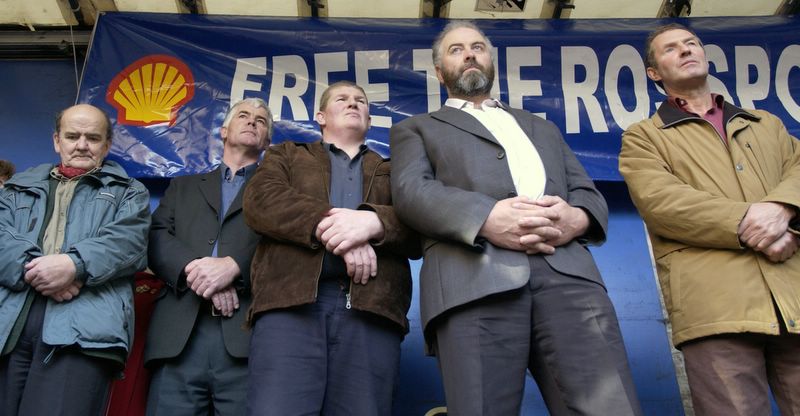
Anna Bissila
The Irish Government rolled out the red carpet for fossil fuel companies in the surroundings of Rossport – RosDumhach in Irish. Already in 1992, taxes were reduced to 25% for these businesses by the Minister for Energy, and the Minister for Communications, Marine and Natural Resources deemed unnecessary for the State to oversee the “search for and production of oil and gas in Irish waters” by private companies. Such legal provisions made it easy for Enterprise OIl – and its subsidiary Enterprise Energy Ireland – to require access to private land, after discovering an exploitable gas field in 1996. Choosing to process the extracted gas in County Mayo without the inhabitant’s consent was also facilitated by a Compulsory Acquisition Order from the Minister, enabling Shell E&P Ireland (SEPIL) to disregard landowners and fishermen’s rights when buying out Enterprise Oil in 2002. This way, Royal Dutch Shell settled both in people’s gardens and in the Special Area of Conservation of the Sruwaddacon Bay – Sruth Fada Con. And in 2005, the same year the movement Shell To Sea rose, the company managed to obtain an injunction against protesters now known as The Rossport Five. They spent 90 days in prison, as did the fisherman Pat O’Donnell a year later after preventing the entrance of the pipe laying ship Solitaire, in a David against Goliath-like action. As in other territories where Shell operates, the police service – Gardaí – got involved, and not to make the people’s demands heard. In addition to pushing the Corrib gas project (which launched in 2015) to protect their health, safety and the soil they have been taking care of for generations, the Rossport Community pointed out how communities are criminalised for private profit.
Credits: Shell to Sea
10. DECOLONIZE EARTH
Anna Bissila
What better place to try and deteriorate the environment for profit than a land on which rightful inhabitants’ presence is already ignored and threatened? Here we say try because the ancestral history of First Nations in British Columbia (Canada) made them aware of the need for resistance against private and colonial interests. A beautiful example of this powerful strength is Shell Canada’s abandonment of their coal-bed methane project in the Tahltan territory. As protectors of the earth who understand land, race or gender-based oppression, this nation and the Wet’suwet’en are an example to follow for well thought out – and necessary – preservation of fauna and flora, but also of ancestral practices and knowledge.
11. BOOKTABLE vs SHELL
Various authors
- Sinaya Wolfert (2019). Life with an Oil Refinery
- Fossil Free Culture (2020). Coffee Table Book
- Ken Saro-Wiwa (2013). Silence Would Be Treason: Last writings of Ken Saro-Wiwa
- Ken Saro-Wiwa (1988). Genocide in Nigeria
- Yeo Woonkyung (2012). Palembang in the 1950s: The Making and Unmaking of a Region (Dissertation) (available here)
- Cos Vrins (2016). Atjeh’s Bloed Olie (available here)
- Lumbung Pustaka Uny (University publisher), BAB III, PERTAMINA SEBELUM DAN SESUDAH KEMERDEKAAN (available here)
- Margriet Brandsma, Heleen Ekker & Reinalda Start (2016). De gaskolonie: van nationale bodemschat tot Groningse tragedie
- Didde, René; Ben Duivenvoorde; Jan Willem van Gelder e.a. (red.) (1989). Als Het Tij Keert: Shell en Nederland, Macht & Verbeelding
- Lorna Siggins (2010). Once Upon a Time in the West
12. WORKERS UNITE
Chihiro Geuzebroek
Photographs:
- Excerpts from the book of Sinaya Wolfert (see BOOKTABLE vs SHELL)
- Nationaal Archief Curaçao
Print:
Vito magazine – announcement of the May 1969 strike
IISG ArchiveText snippets: Curacao Chronicle: May 30 1969 A Day not to forget
13. CLIMATE JUSTICE & ENERGY TRANSITION
Shell Must Fall campaign
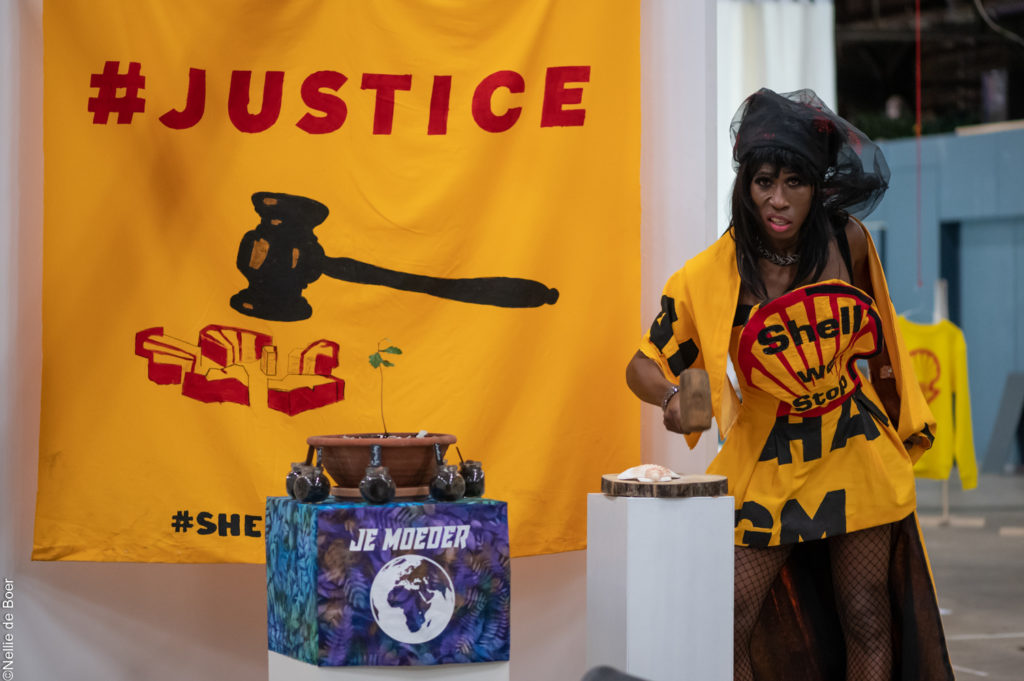
Banner used among others during a Shell Must Fall action day organized in Amsterdam in 2020. Design inspired by a ritual video of Je Moeder.
JeMoeder
Ritual table.
A Shell stands for a true force of life, a symbol now hijacked by a megalomanic energy company, representing a force of death. What happens after the spells of capitalism, imperialism, colonialism and exploitation, get broken by the hammer of justice? Energy is neither created nor destroyed -only transformed- Je Moeder (Your Mom) reclaims Shells force with a life-honoring ritual where its broken pieces serve a seedling being a soil enhancer. This is how we compost capitalism, transforming it into a decentralised structure, using the blessings that serve new life.
“Zo kunnen zelfs eikels uitgroeien tot iets moois”
14. ICONIC ACTIONS
Window 1 – Brent Spar & Northsea related actions, 1995
“A rather unassuming floating oil storage buoy in the North Sea, the Brent Spar made headlines worldwide in 1995. The debate about what to do with it at the end of its useful life caught its co-owner and operator, Shell (then the Royal Dutch/Shell Group of Companies), seriously off-guard. It was one of the defining moments in the modern history of corporate responsibility, the echoes of which can still be heard.” – Reuters 2010
Window 2 – Save the Arctic, 2016
Picture with Audrey Siegl: “I am backing the peoples fight against Arctic oil because we each have a responsibility to protect what is sacred. All life is sacred.”
Window 3 – People vs Oil, 2019
Indigenous land of Mapuche, Argentina – Occupation of Wallmapu by Osvaldo Tesoro
Dozens of Greenpeace Argentina activists blockade the entrance to a toxic waste facility in the north of Argentine Patagonia, owned by Treater S.A and used by oil companies like Shell and Total to dispose of the waste created by their dangerous fracking operations in the region. The activists display banners and signs calling for an end to the oil age.The toxic landfill site, equivalent in size to 15 football fields, is used by oil companies that are fracking Patagonia. Local regulations require that hazardous waste treatment or disposal facilities be at least 8km away from people and towns, and at least 5 km away from bodies of water and crops. The landfill is also located 5 km away from the Añelo community, 4.9 km from agricultural fields and 3.7 km from the Neuquen River, which infringes Neuquen’s Provincial Law, and Argentina’s General Law on Environment.
Window 4 – People vs Oil, 2019
Batangas, Philippines – Occupation of Batangas oil Refinery by Geric Cruz
Note: Refinery closed permanently in 2020
Eight (8) activists climbed on top of one of the facility’s silos, unfurled a banner with the words “Shell, stop burning our future.” in Batangas refinery of fossil fuel giant Shell, South of Manila.The peaceful protest is a bold challenge to fossil fuel companies to show accountability for their role in the climate crisis, heed the call of climate-impacted communities for justice, and start a rapid and just transition to phase out fossil fuels.
Source: Greenpeace media library
Actions depicted are Greenpeace UK, US, Philippines and Argentina pictures taken between 1995 and 2019
15. GASQUAKES
Groninger Bodem Beweging, Code Rood, Milieudefensie
Window 1 – News items about the blurred lines between the state and the gas industry
Note: NAM = Shell + Exxon

Source: Shell Investors’ Handbook 2014-2018
Window 2 – Photographs
March with torches have been held numerous times in the city of Groningen, to demonstrate grievances with lack of care, reparations and accountability for the loss and damage that communities in the North of Netherlands have suffered due to gas extraction and related earthquakes and soil movement. In 2016 around 500 people marched against Gasbesluit (Gas decision) of MP Kamp. In 2018 around 10.000 marched after the earthquake at Zeerijp.
Soil movement up to a meter and earthquakes were already predicted in the 1960’s. Ambulance staff was trained to prepare for a certain number of earthquakes to retrieve bodies from the rubble, rather than abandoning harmful ways and making right with local communities. No lethal accidents have occurred during the earthquakes. But there have been over a thousand earthquakes and people have lost homes and safety and are discontent with the neglect of the gas industry (NAM = Shell and Exxon) and Dutch political course that got rich of the gasfields and by enlarge disregarded impacted communities.
Window 3
The Groninger Soil Movement (GBB) is an association founded on November 6, 2009 with the aim of standing up for the interests of people who are directly or indirectly damaged by gas extraction in the Groningen gas field. Pictures illustrate some of the actions GGB has organized.
Window 4 – Photograph and action relic
Collaborative Knitting action of Groningers asking for solidarity and justice.
Source: Milieudefensie
Window 5 – Code Rood climate justice camp in Leermens & actions in Farmsum, Delftzijl municipality
Extract of communication from Code rood, September 5th 2018:
Dear people,
The action week of Code Rood in Groningen was a huge success! Thanks to hundreds of participants in the action, volunteers, donors and people who have spread our message, we sent out a strong signal: the use of fossil fuels has to stop now and it’s time for a fair recovery of Groningen and the climate! With approximately 700 people we disrupted the gas extraction of the NAM, by a massive civil disobedient sit-in.
During the action week we also created many bridges between movements, through a rich and inspiring program at the camp in Leermens.
Credits: Groninger Bodem Beweging, Milieudefensie
16. GAME TIME
Milieudefensie
Donated action relic.
Protest is an act of proclamation; and it is an exercise of collective articulation of what we want and which skins of harm we wish to shred. It is a common (mediated) lie that protest is “negative” or “anti”. Protest is a collective statement. Saying it is negative is a sneaky tactic to not engage with arguments and proposals that a movement puts on the table to remedy harm. With GAME TIME the vision for a brighter future is made clear and simple: with sufficient People Power a carbon major like Shell can fall.“I think it will be a good educational playful element in our future Museum for Climate Justice. Teaching kids we must practice what we preach and make corporations causing mass destruction fall” – Chihiro Geuzebroek.
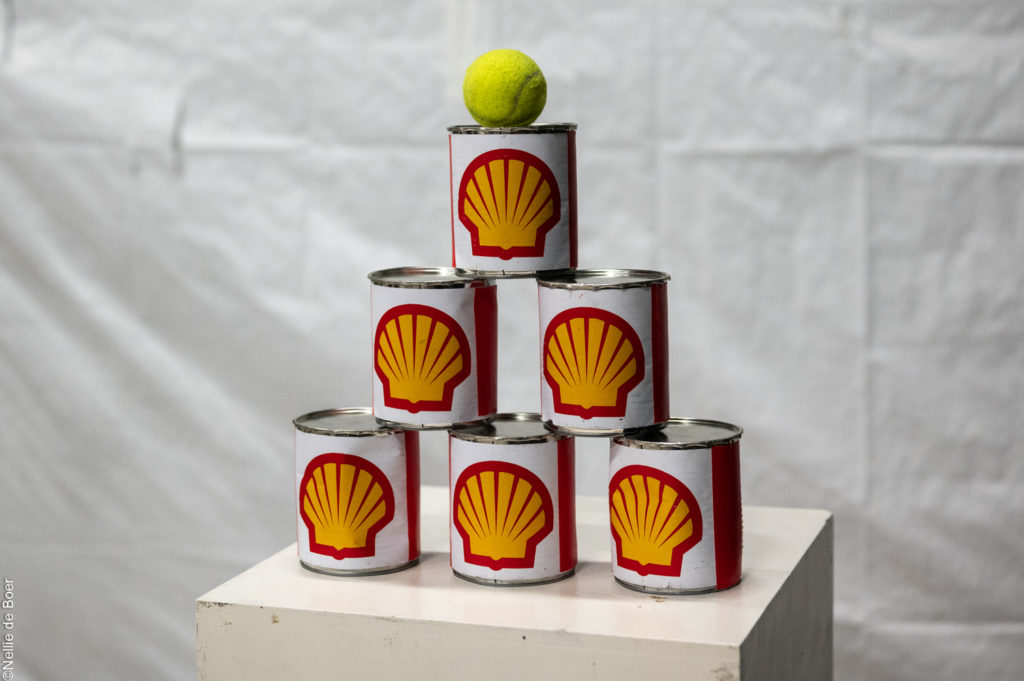
17. SHELL MUST FALL CAMPAIGN 2019-2020
Code Rood
In 2019 the coalition of Shell Must Fall came to the Circustheater in The Hague, to speak truth to power at Shell AGM. Four speakers addressed the board and announced their intentions to make 2019 the last year to have a Shell AGM. The speakers addressed many grievances that Shell had caused from pollution to corruption and land grabbing and violating Indigenous rights and governance and climate racism. All ended with the question to the board: “Since there will be no AGM next year: what will you do with your free day?”
There were over 30 shareholders in the theatre addressing questions on climate and climate justice. When the coalition speakers of Shell Must Fall spoke other shareholders started booing and shouting: “Shut up”, “Get out”. In the end around half of the shareholders present walked out of the theatre. The board cut of one of the speakers by saying: “Silence mic no.1”.
One of the shareholders hissed at a speaker: “If you care so much about climate change why don’t you just kill yourself?”.
When the mic was cut off the speaker ended with raised voice: “We will not die quietly!”. Code Rood action group took the lead in coalition building. In 2020 the plans for mass civil disobedient action in may had to be adapted due to COVID19. Still people in 20 cities took actions. Grassroots groups that answered to the call to Make Shell Fall included people Limity Jsme My, XR, Fridays for Future. Actions took place in 10 cities across Netherlands and extended to Germany, Belgium, Austria, Czech Republic. UK and Denmark and Finland have also taken action in the Shell Must Fall campaign.
18. OIL KILLS
Code Rode – Shell Must Fall Campaign
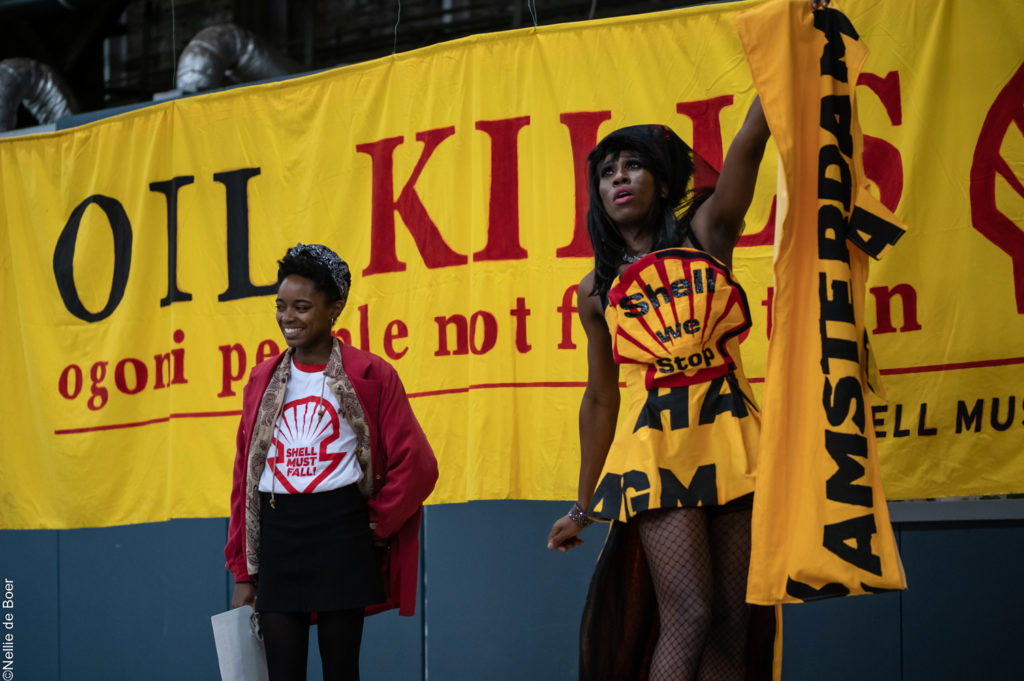
This banner was produced and used in action in November 2019 at The Hague Shell HQ to show the stolen lives of the Ogoni Nine are not forgotten and continue to inspire climate justice activists in the Netherlands to seek restorative justice. At the action there was a silent march and at location there were speeches and a commemoration ceremony.
19. SHELL SUMMONS
Milieudefensie & Chihiro Geuzebroek
Pictures march of co-plaintiffs and banner listing their name.
On April 4th 2018, Milieudefensie announced that it is starting a court case against Shell.
The Hague, April 5, 2019 – On the fifth of April 2019 Friends of the Earth Netherlands will deliver a court summons to Shell to legally compel the company to cease its destruction of the climate, on behalf of more than 30,000 people from 70 countries. A 236 page complaint was delivered to Shell’s International Headquarters in the Hague by Friends of the Earth Netherlands, ActionAid NL, Both ENDS, Fossielvrij NL, Greenpeace NL,Young Friends of the Earth NL, Waddenvereniging and a large group of co-plaintiffs.
20. DRESSED FOR ACTION
Nopulence Label
Dress made out of a protest banner for the Fashion section of Extinction Rebellion, and pictures of the Rebellion Week.
September 26th 2020
Activists/designers of the climate movement Extinction Rebellion launched the “label of nothing”: Nopulence, on Saturday September 26th, 2020. Through Nopulence, Extinction Rebellion shows its vision of the concept of clothes. We have enough here, let’s appreciate those we have. Do not buy, DIY, repair, rebel! Clothes exist for us, not the opposite. Make an action outfit and go out on the streets to campaign for climate! The launch consisted in 17 outfits plus 3 clothes creation and repair workshops.
The group of designer activists worked for 5 months on this “collection of nothing”. The label is ego-free, non-commercial, and stands for diversity and inclusion. The clothes are not for sale, but they are available for activists.
Aryelle Freeman Hopelezz, who wears the ‘Shell We Stop’-dress on the photos and during the opening of this exposition, is an international model, catwalk coach and casting judge (a.o. African Fashion Week Amsterdam) and Amsterdam Drag Olympic Champion in 2017 and 2019.
Concept: Stephanie Wels
Design: David Pronker
Model: Aryelle Freeman Hopelezz (IG/FB: @aryellefreeman_hopelezz)
Photographer: Chihiro Geuzebroek
Shell Must Fall Campaign
May 19th, 2020 – Royal Dutch Shell Headquarters, The Hague, The Netherlands
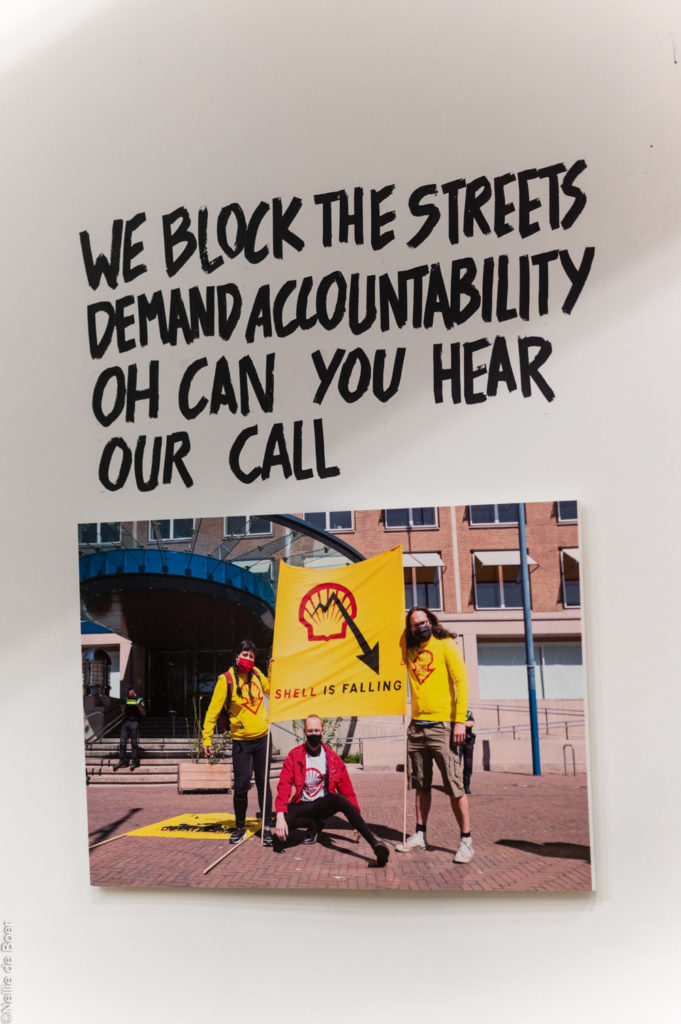
Lyrics from “The Sound of Climate Justice“, or Shell Must Fall Song. Credits: Nellie de Boer.
Wearing your message is the best way to spread it. How do you see the future of Shell, after its necessary fall from its pedestal of fossil fuel and carbon emissions giant?
Credits: Jamil Fiorino-Habib
Code Rood
During the Code Rood mass civil disobedience action in Groningen in 2018, police acted violent twice towards civilians taking action. They followed and intimidated the people from Code Rood, let aggressive dogs threaten the people, hit the people with the “wrong” side of their police batons which injured several people.To make a statement, one of the wounded protesters smeared his blood all over the police car. The police tried to frame these assaults as a mistake, “a communication error”, but police brutality against civilians and activists for social justice in particular is as common in the Netherlands as it is abroad.
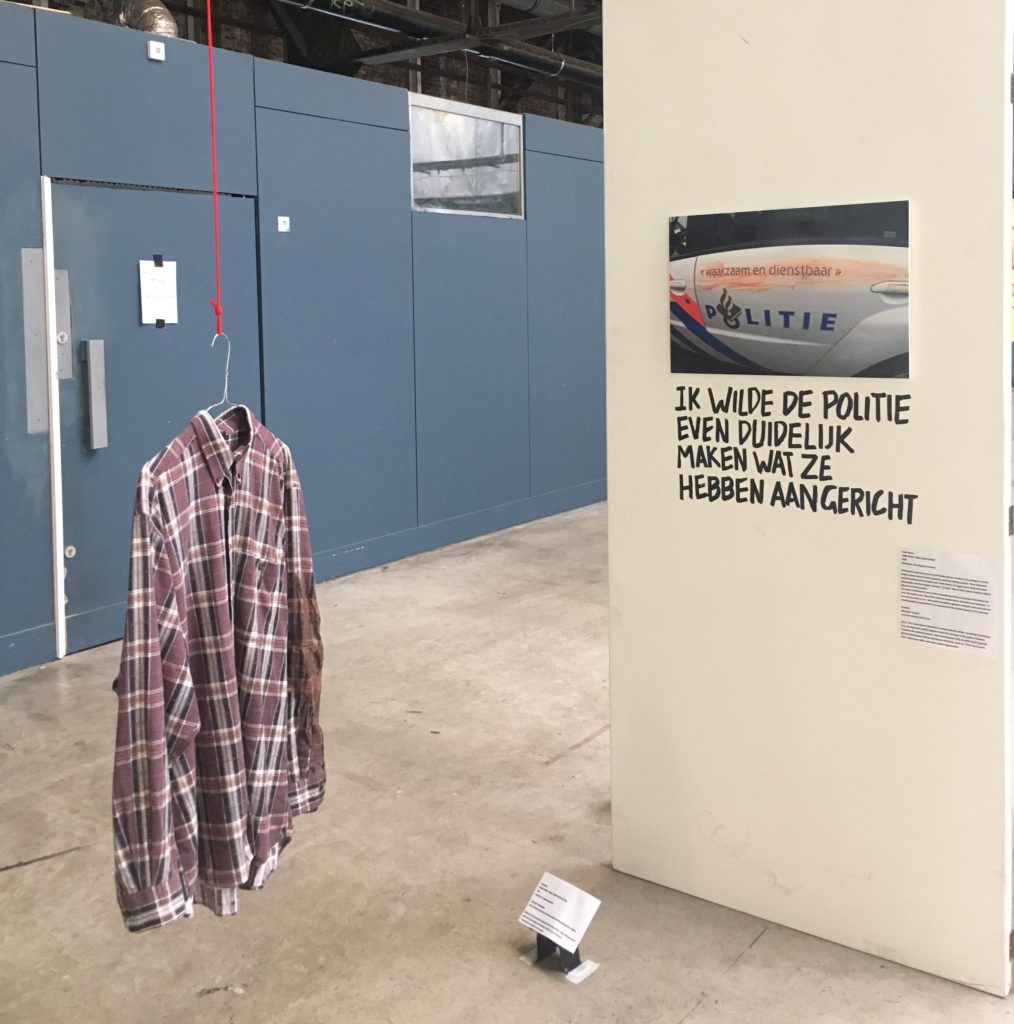
Credits: Michelle Tylicki
Note: The Code Rood collective is comparatively white, resulting in privilege (e.g. facing more public support when the footage of the police violence reached the national news). Other movements with an anti-racist agenda and predominately Black and Brown activists, such as “Kick Out Zwarte Piet”, often face with even more police oppression.
Fossil Free Culture
Art performance by Fossil Free Culture, May 2017, Van Gogh museum, Amsterdam
On May 30th 2017, in the entrance hall of the Shell-sponsored Van Gogh Museum, seven muses silently look over the public as they sip their indigestibly oily amuse-bouches from a scallop shell. One muse recites a paragraph from Vincent van Gogh himself — from a letter to his brother — on the subject of courage in the face of danger. It talks about the rising waters and finding the strength to struggle to survive.
The museum, however, is not amused; it corrals the artists and calls the police on them. They spend the night in jail. Four among them choose not to identify themselves, as is common practice amongst detained people of good conscience who wish to show solidarity with undocumented migrants. For this they are taken to foreign detention for a second, and even a third night.
According to the museum, the dripping of a non-staining glucose syrup on the floor is public “property damage” — but fracking, drilling, burning and spilling fossil fuels planet-wide is somehow not. The museum also considers an unsolicited art performance as “trespassing” — while allowing corporate polluters to host parties in front of publicly-funded national treasures is not.In the summer of 2018 and 4 more performances later the Van Gogh Museum dropped Shell.
Credits: Laura Ponchel
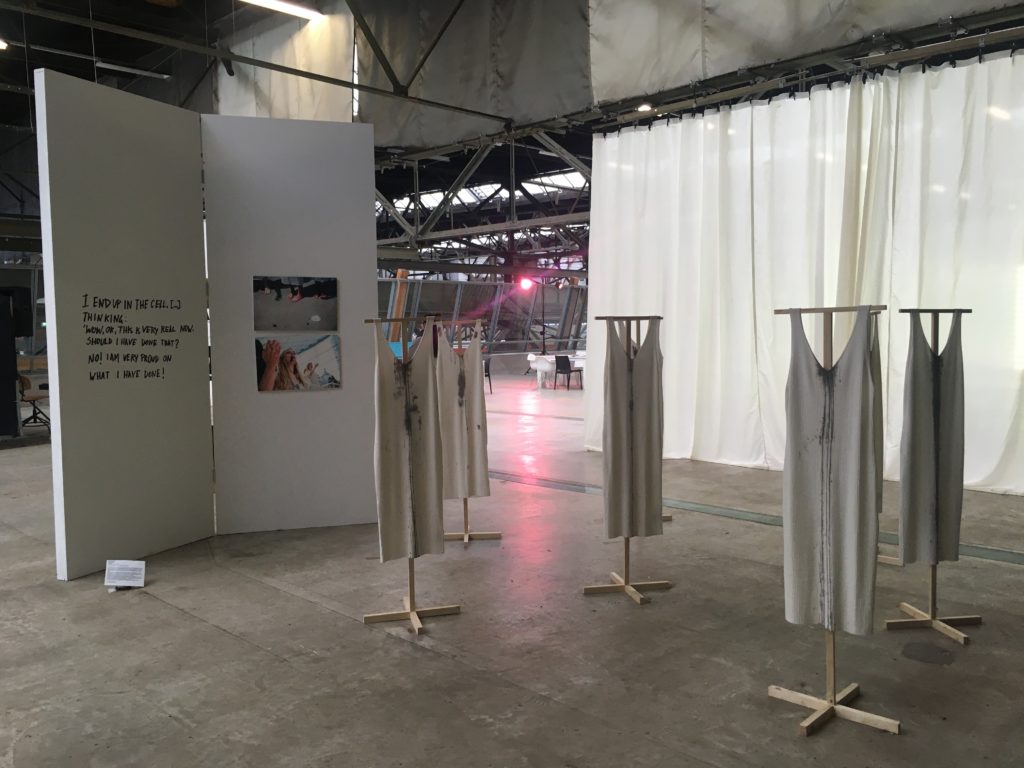
DIY/PEOPLE POWER
Merchandise to articulate your participation in People Powered Movement vs Shell
Design from: Shell Must Fall, Milieudefensie and Je Moeder

